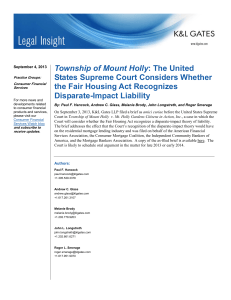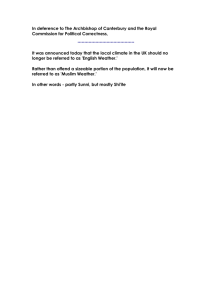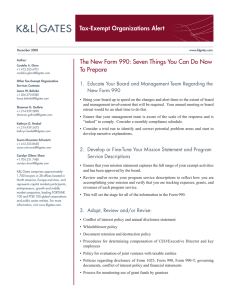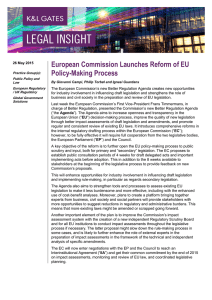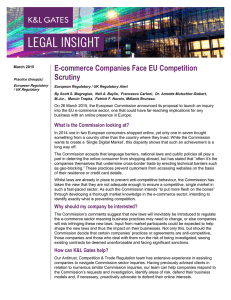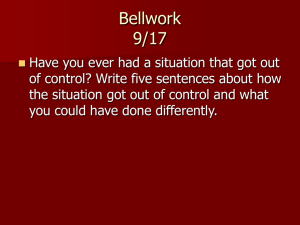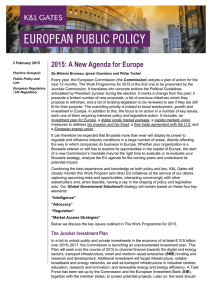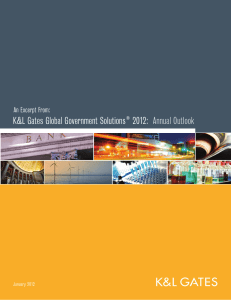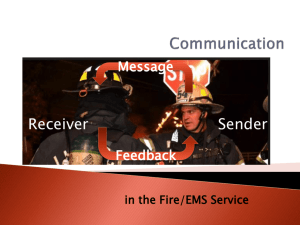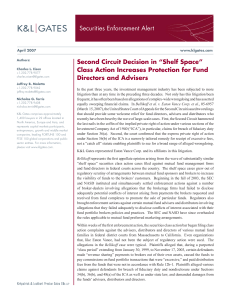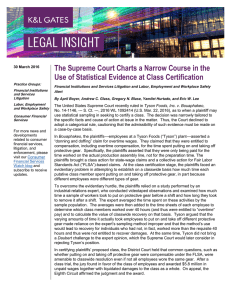K&L Gates Global Government Solutions 2011: Mid-Year Outlook An Excerpt From:
advertisement
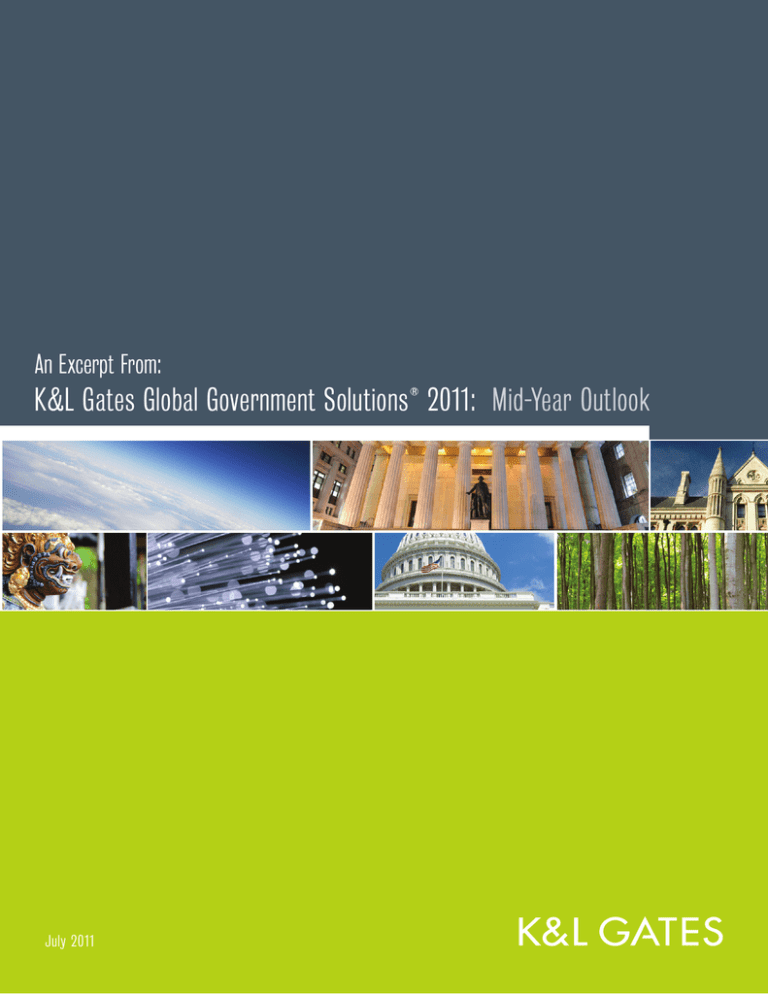
An Excerpt From: K&L Gates Global Government Solutions ® 2011: Mid-Year Outlook July 2011 Government Enforcement and Litigation U.S. Supreme Court: Key Decisions of Interest to Business This Term At the beginning of the 2010-2011 Supreme Court term, we previewed upcoming cases that raised significant issues for the business community. The term is not yet complete as this article goes to press, but the most eagerly anticipated decisions have been handed down. In the most closely-watched case of the term, the business community claimed a significant victory when the Court reversed the certification of the largest plaintiff class in history—1.5 million women alleging gender bias in pay and promotions at WalMart. (Wal-Mart v. Dukes, No. 10-244). All of the justices agreed that the case was improperly certified under the rule intended to govern injunctive class actions, as the plaintiffs sought significant monetary relief in the form of back pay awards. The majority went further, however, and held that the class could not be certified at all because the plaintiffs had provided “no convincing proof of a company-wide discriminatory pay and promotion policy.” This significant tightening of the requirement of a “common question of law or fact” will affect class certification decisions for a wide variety of claims, not just discrimination claims. In AT&T Mobility, LLC v. Concepcion, No. 09-893, the Court continued to take a skeptical approach to classwide arbitrations by affirming the effectiveness of contractual protections against such actions. The Court’s decision overturned the Ninth Circuit’s holding that it was “unconscionable” under California contract law for a wireless provider to include in its service agreement a provision requiring that all disputes be resolved in individual arbitrations. The Court’s opinion catalogues the risks of classwide arbitrations to defendants, which include a “slower, more costly” process and an increased risk of error due to the “absence of multilayered review” that “may become unacceptable when damages allegedly owed to thousands of claimants are aggregated and decided at once.” In American Electric Power Co. v. Connecticut, No. 10-174, the Court held that private parties cannot seek to hold utilities liable under federal common law for creating a “public nuisance” in the form of climate change, since Congress has displaced federal common law by providing in the Clean Air Act for regulation of greenhouse gases by the Environmental Protection Agency (EPA). The AEP decision did not go as far as some in the business community had wanted, as it affirmed on an equally divided vote the lower court’s ruling that plaintiffs had standing to sue. The Court also left open the possibility of state law nuisance claims, though suggesting they might be preempted as well. In the intellectual property arena, the Court reversed a long trend and affirmed the Federal Circuit in all three patent cases it reviewed this term. The Court confirmed: • the Federal Circuit’s rule that a party asserting invalidity of a patent must show invalidity by clear and convincing proof (Microsoft Corp. v. i4 Ltd. Partnership, No. 10-290); • its holding that an inventor working for a government contractor does not automatically lose title to his inventions (Bd. of Trustees of Stanford v. Roche Molecular Systems, No. 09-1159); and • its ruling that induced infringement requires knowledge of actual infringement (Global-Tech Appliances, Inc. v. SEB SA, No. 10-6). The Court this term has consistently deferred to federal agencies’ interpretations and implementation of statutes. In Mayo Foundation v. United States, No. 09-837, the Court held that the highest level of deference, so-called “Chevron” deference, should be given to rules issued under general, as well as specific, grants of authority—disapproving some earlier cases that declined to give full deference to rules issued under general grants. The Court also deferred to agency constructions in holding that corporations have no right of personal privacy under the Freedom of Information Act (FCC v. AT&T, Inc., No. 09-1279), and in affirming the FCC’s interconnection rules for telecommunications providers. (Talk America, Inc. v. Michigan Bell Telephone, Inc., No. 10-313). In this latter case, Justice Scalia suggested that he was willing to rethink the long-standing “Auer/Seminole Rock” rule of deference to an agency’s construction of its own regulations, but no other justice joined his opinion, and the Court readily applied the rule of deference. Finally, as predicted in our last report, the Court refused to hear constitutional challenges to the 2010 federal health care legislation before those challenges were considered in the courts of appeals. Arguments have been heard in three appellate courts, decisions will issue this summer, and the Court will likely be in a position to decide in the fall whether to hear any of the cases next term. Dick Thornburgh (Washington, D.C.) dick.thornburgh@klgates.com David R. Fine (Harrisburg) david.fine@klgates.com John Longstreth (Washington, D.C.) john.longstreth@klgates.com The Court has generally reviewed Federal Circuit opinions primarily to reverse them, and these decisions suggest that the Court may show more deference to the generally “patent-friendly” appeals court. K&L Gates Global Government Solutions ® 2011 Mid-Year Outlook 51 Anchorage Austin Beijing Berlin Boston Brussels Charlotte Chicago Dallas Doha Dubai Fort Worth Frankfurt Harrisburg Hong Kong London Los Angeles Miami Moscow Newark New York Orange County Palo Alto Paris Pittsburgh Portland Raleigh Research Triangle Park San Diego San Francisco Seattle Shanghai Singapore Spokane/Coeur d’Alene Taipei Tokyo Warsaw Washington, D.C. K&L Gates includes lawyers practicing out of 38 offices located in North America, Europe, Asia and the Middle East, and represents numerous GLOBAL 500, FORTUNE 100, and FTSE 100 corporations, in addition to growth and middle market companies, entrepreneurs, capital market participants and public sector entities. For more information about K&L Gates or its locations and registrations, visit www.klgates.com. This publication is for informational purposes and does not contain or convey legal advice. The information herein should not be used or relied upon in regard to any particular facts or circumstances without first consulting a lawyer. ©2011 K&L Gates LLP. All Rights Reserved.

